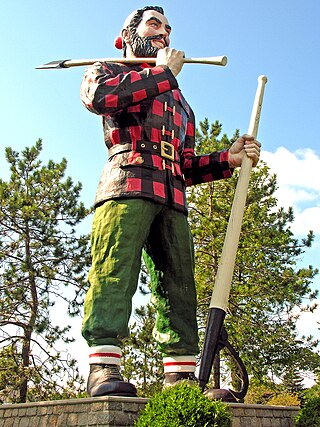
Paul Bunyan is a giant lumberjack and folk hero in American and Canadian folklore. His tall tales revolve around his superhuman labors, and he is customarily accompanied by Babe the Blue Ox, his pet and working animal. The character originated in the oral tradition of North American loggers, and was later popularized by freelance writer William B. Laughead (1882–1958) in a 1916 promotional pamphlet for the Red River Lumber Company. He has been the subject of various literary compositions, musical pieces, commercial works, and theatrical productions. His likeness is displayed in a number of oversized statues across North America.

Clangers is a British stop-motion animated children's television series, consisting of short films about a family of mouse-like creatures who live on, and inside, a small moon-like planet. They speak only in a whistled language, and eat green soup and blue string pudding. The programmes were originally broadcast on BBC1 between 1969 and 1972, followed by a special episode which was broadcast in 1974.

Edward Benjamin Britten, Baron Britten was an English composer, conductor, and pianist. He was a central figure of 20th-century British music, with a range of works including opera, other vocal music, orchestral and chamber pieces. His best-known works include the opera Peter Grimes (1945), the War Requiem (1962) and the orchestral showpiece The Young Person's Guide to the Orchestra (1945).
A tall tale is a story with unbelievable elements, related as if it were true and factual. Some tall tales are exaggerations of actual events, for example fish stories such as, "That fish was so big, why I tell ya', it nearly sank the boat when I pulled it in!" Other tall tales are completely fictional tales set in a familiar setting, such as the European countryside, the American frontier, the Canadian Northwest, the Australian outback, or the beginning of the Industrial Revolution.

Peter Grimes, Op. 33, is an opera in three acts by Benjamin Britten, with a libretto by Montagu Slater based on the section "Peter Grimes", in George Crabbe's long narrative poem The Borough. The "borough" of the opera is a fictional small town that bears some resemblance to Crabbe's – and later Britten's – home of Aldeburgh, Suffolk, on England's east coast.

Punch and Judy is a chamber opera with music by Harrison Birtwistle and a libretto by Stephen Pruslin, based on the puppet figures of the same names. Birtwistle wrote the score from 1966 to 1967. The opera was first performed at the Aldeburgh Festival, which had commissioned the work, on 8 June 1968, with David Atherton conducting the English Opera Group. The premiere cast included John Cameron as Mr Punch.
Mordecai Hirsch Bauman was an American baritone.

Gerald English was an English tenor. He performed operatic and concert repertoire, was a recording artist, and was a sometime academic.
The Habit of Art is a 2009 play by English playwright Alan Bennett, centred on a fictional meeting between W. H. Auden and Benjamin Britten while Britten is composing the opera Death in Venice. It premiered on 5 November 2009 at the Lyttelton Theatre at the Royal National Theatre, with the central roles filled by Alex Jennings as Britten and Richard Griffiths as Auden. The performance of April 22, 2010 was broadcast to more than 200 cinemas worldwide by NTLive.

Peter Coleman-Wright is an Australian baritone from Geelong. He began his career at Glyndebourne Festival Opera, where he sang Guglielmo in Così fan tutte, winning the Touring Prize. Subsequently, he sang Sid in Albert Herring and Demetrius in A Midsummer Night's Dream and Pizzaro in Fidelio.

Paul Bunyan is a 1958 American animated musical short film produced by Walt Disney Productions. The short was based on the North American folk hero and lumberjack Paul Bunyan and was inspired after meeting with Les Kangas of Paul Bunyan Productions, who gave Disney the idea for the film. The film was directed by Les Clark, a member of Disney's Nine Old Men of core animators. Thurl Ravenscroft starred as the voice of Paul Bunyan. Supporting animators on the project included Lee Hartman.

Canadian folklore is the traditional material that Canadians pass down from generation to generation, either as oral literature or "by custom or practice". It includes songs, legends, jokes, rhymes, proverbs, weather lore, superstitions, and practices such as traditional food-making and craft-making. The largest bodies of folklore in Canada belong to the aboriginal and French-Canadian cultures. English-Canadian folklore and the folklore of recent immigrant groups have added to the country's folk.
Since the folkloric hero Paul Bunyan's first major appearance in print, the character has been utilized to promote a variety of products, locations, and services. The giant lumberjack's mass appeal has led him to become a recurring figure in entertainment and marketing, appearing in various incarnations throughout popular culture.

Abigail Kelly is an English soprano opera and concert singer.
Martin McEvoy is an English opera singer, producer, presenter and broadcaster. He has specialised in playing light baritone roles in opera and operetta especially those in the Gilbert & Sullivan repertoire. He broadcasts regularly on BBC Radio. McEvoy is the founder and artistic director of Crystal Clear Opera, London City Opera and Martin McEvoy Productions.
Carroll Freeman is an American operatic tenor, opera director, and music educator. He began his career as a prominent boy soprano in the 1960s. From the late 1970s through the mid 1990s he performed widely as a tenor with opera companies and orchestras in the United States. After that he worked as a director of opera productions with opera companies throughout North America. He is the former director of the opera program at the University of Tennessee and currently directs the opera program at Georgia State University. He is also the former Artistic Director of Mississippi Opera, Opera in the Ozarks at Inspiration Point, and opera studios at Knoxville Opera and Des Moines Metro Opera.

Ulla! min Ulla! säj, får jag dig bjuda, is one of the Swedish poet and performer Carl Michael Bellman's best-known and best-loved songs, from his 1790 collection, Fredman's Epistles, where it is No. 71. A pastorale, it depicts the Rococo muse Ulla Winblad, as the narrator offers her "reddest strawberries in milk and wine" in the Djurgården countryside north of Stockholm.
Benson Wilson is a New Zealand-born baritone opera singer of Samoan heritage currently based in London, United Kingdom.
Robert Vambery was a theatre director, author and teacher, associated with the works of Kurt Weill.









